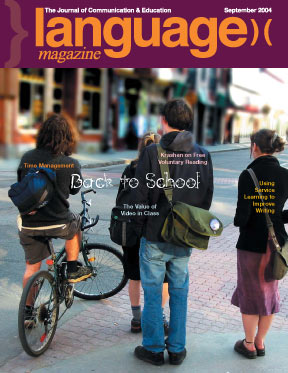A Tale of Two Americas

As the Republican Party National Convention dominates the U.S. headlines, Democratic vice-presidential candidate John Edwards is being roundly criticized and even mocked for his campaign mantra of “two Americas… one privileged, the other burdened…one America that does the work, another that reaps the reward. One America that pays the taxes, another America that gets the tax breaks.”
Former New York Mayor Rudy Giuliani got one of the biggest laughs at the convention when he said, ‘’Maybe this explains John Edwards’ need for two Americas — one where John Kerry can vote for something and another one where he can vote against exactly the same thing.’’ However, in the area of education, the notion of “two Americas” is far from a laughing matter.
Although education policy has not been a central theme of the convention, Education Secretary Rod Paige claimed that there has been an increase in federal education funding, when the No Child Left Behind law has had a funding shortfall of $9.5 billion this year. More than half of all U.S. school districts are receiving less Title I money this year than they did in the previous year, forcing them to be accountable for more while providing them with less. The repercussions of underfunding are being felt across the nation. Even in Texas, school districts are having to sue the state for inadequate funding of bilingual programs (see News, page 12).
Unless we educate the least privileged sectors of society, we will create a divided society — a society in which the less educated become an underclass, unable to even support themselves, let alone achieve the American dream. Educating children with limited English is expensive, but the long-term costs of not doing so are much greater. If we are to avoid the perils of a polarized society, we must invest now in the education of those who most need it to make sure that the achievement gap between the rich and the poor, between the English proficient and the non-English proficient narrows.
California Governor Arnold Schwarzenegger joined the ranks of Republicans in mocking John Edwards’ notion of ‘two Americas,” but California’s latest school report card shows that the achievement gap between English learners and their English-proficient counterparts is widening (see News, page 11.)
As an immigrant himself, Schwarzenegger recognizes America’s need to provide immigrants with opportunities, “Everything I have — my career, my success, my family — I owe to America,” the actor said. “…America gave me opportunities and my immigrant dreams came true. I want other people to get the same chances I did, the same opportunities.”
We need to provide all children with the education they need to succeed in our society or we will create “two Americas,” and undermine the very basis on which this country was founded.
IN THIS ISSUE:
Tiempo Libro
Stephen Krashen reports on new research, applications, and controversies concerning Free Voluntary Reading (FVR)
Making Writing Relevant
Kelly Kennedy-Isern explains how Service Learning is used at Miami Dade College in Florida to enhance the ESL writing experience
World Views
Domenico Maceri suggests there is safety in languages
Watch My Lips
Karina Wilson predicts a bright future for video in the ESL classroom and suggests some innovative products
Time for Class
Time is at a premium in the classroom, so Christopher Vang suggests time management strategies to help you make the most of the new academic year
Pronounced Perfect
In the fourth part of our series on teaching English pronunciation, Steven Donahue continues to explain how to master consonants


